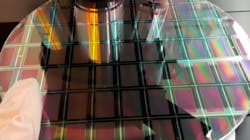Plessey Semiconductors (Plymouth, England) and Nanoco Technologies (Manchester, England) announced a partnership to shrink the pixel size of monolithic microLED displays using Nanoco's cadmium free quantum dot (CFQD) semiconductor nanoparticle technology. Using its existing monolithic process, Plessey will integrate the Nanoco CFQD quantum dots into selected regions of blue LED wafers to add red and green light. This shrinks the smallest practical pixel size from today's 30 microns to just 4 microns--a reduction of 87%. The process will enable the production of smaller, higher-resolution, microLED displays in applications such as AR/VR devices, watches, and mobile devices, while enhancing both color rendition and energy efficiency.
For pixels of 30 microns or greater, color conversion is currently performed by adding phosphors to the blue die. However, since the smallest phosphor particle is around 30 microns, the efficiency of color conversion deteriorates as the pixel size shrinks. Nanoco's CFQD quantum dot technology overcomes this limitation while facilitating efficient, compact device packaging.
Compared with all other display technologies, microLEDs are brighter, smaller, lighter, more energy-efficient and have a longer operating life. Where they replace OLEDs, for example in AR/VR goggles or head-up displays, Plessey microLEDs offer ten times the resolution, 100 times the contrast ratio, and up to 1000 times the luminance. They do so at half the power consumption, doubling battery life in portable devices. They also feature perfect blacks, realistic color, and immunity to burn-in or decay over time.
Plessey was recently named as a 'CES 2019 Innovation Awards Honoree.' The company will be showcasing its microLED technology at the CES event in the Las Vegas Convention Center, South Hall 1, stand 22048.
Plessey provides volume processing of its GaN-on-silicon platform for a wide range of optoelectronic devices and systems and operates 150 and 200 mm wafer processing facilities to undertake design, test and assembly of products, and a comprehensive suite of photonic characterization and applications laboratories.
Plessey provides illuminators for display engines (DMD and LCOS) and full-field emissive microLED displays that combine very high-density RGB pixel arrays with CMOS backplanes to produce very high-brightness, low-power, and high-frame-rate image sources for head-mounted displays (HMDs), and augmented reality (AR) and virtual reality (VR) systems.
Nanoco's CFQD quantum dots are free of cadmium and can be tuned to absorb and emit light at different wavelengths across the visible and infrared spectrum, rendering them useful for a wide range of commercial applications including displays, lighting, sensors and biological imaging. Nanoco has licensed its technology to The Dow Chemical Company, Merck KGaA of Germany and Wah Hong Industrial Corporation of Taiwan for use in display applications.
SOURCE: Plessey Semiconductors; http://www.plesseysemiconductors.com/nanoco-plessey-partner-shrink-full-colour-microled-pixels-87-using-quantum-dots/

Gail Overton | Senior Editor (2004-2020)
Gail has more than 30 years of engineering, marketing, product management, and editorial experience in the photonics and optical communications industry. Before joining the staff at Laser Focus World in 2004, she held many product management and product marketing roles in the fiber-optics industry, most notably at Hughes (El Segundo, CA), GTE Labs (Waltham, MA), Corning (Corning, NY), Photon Kinetics (Beaverton, OR), and Newport Corporation (Irvine, CA). During her marketing career, Gail published articles in WDM Solutions and Sensors magazine and traveled internationally to conduct product and sales training. Gail received her BS degree in physics, with an emphasis in optics, from San Diego State University in San Diego, CA in May 1986.
